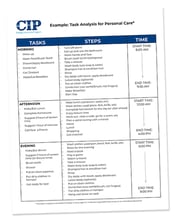
- transition
Adjusting to Transitions: For Young Adults on the Autism Spectrum or with Learning Differences
As the season's change and students prepare to return to school, college, or post-secondary programs, it's not uncommon to feel anxious about a plethora of issues like being away from family and friends, adjusting to new routines, or just change in general.
Learning to properly transition into a new environment is key during this time, especially for teens and young adults on the autism spectrum or with learning differences.
At College Internship Program (CIP) we value a work/life balance; breaks are necessary and beneficial for young adults with autism and learning differences and their growth towards independence. Our students work hard to focus on their academic classes, programming modules, internships, employment and social opportunities. We encourage our students to strive for consistency during transitions. Young adults in general tend to feel uncomfortable with change and our student population, if put in an unfamiliar situation, may be prone to anxiety, stress, and/or becoming overwhelming and stuck.
Falling behind on daily routines such as hygiene, schedules (wake-ups/bedtime), and meal times can be detrimental to students and their progress. Here are some strategies to keep in mind to promote a smooth transition process for when change happens. These activities of daily living are important to practice and strengthen all year long.
Here are some great questions to ask your student:
- What time do you usually go to bed at night?
- What do you typically eat for breakfast? Do you think it’s healthy food?
- What time do you typically arrive at school or work? Are you ever late?
- What time do you eat lunch? Do you eat alone or with other people?
- What time do you get home after school or work?
- Are you tired when you get home?
- What’s your favorite TV show? Why do you like it?
- How much time do you spend on-line each day? Do you think that is too much?
- What time do you usually eat dinner?
- What hobbies do you have? What’s your favorite hobby?
- How do you like to relax in the evenings?
Asking these questions will allow you to get a general idea of how your student spends their time. In place of the previous structured time, your student should have something to do instead. For example, there are parks and recreational programs for young adults to join (dance class, gardening, pottery, volleyball, skating, etc). We encourage our students to research different MeetUps in their local areas, see if their peers would like to connect and also encourage them to maintain their daily routines (meal times, sleep habits, leisure time, etc).
Structure is Essential
 Creating a structured schedule is essential for students with learning differences and provides comfortability strong enough to navigate throughout their community and everyday life. Each student requires their own routine, specific to their learning style to achieve their daily goals. Using various prompts tailored to the students' learning style such as verbal, visual, or tactile reminders assists students with their daily tasks.
Creating a structured schedule is essential for students with learning differences and provides comfortability strong enough to navigate throughout their community and everyday life. Each student requires their own routine, specific to their learning style to achieve their daily goals. Using various prompts tailored to the students' learning style such as verbal, visual, or tactile reminders assists students with their daily tasks.
During transitions, students should maintain their morning and evening routines. This can be a daily struggle, especially if there is “nothing to do” or they “have no plans to go out”. Nevertheless, it is important to practice consistency.
Click the image to see a sample Task Analysis chart for personal care that we utilize for our students at CIP.
Methods for Resolving Conflict
Even with set schedules and consistent routines, you may see some regression when a student is trying to adjust to new transitions. Students may become escalated when things do not go as planned. Communication (in a calm tone) and transparency with students helps regulate heightened behavior. Reminders and visuals are beneficial and age appropriate rewards are excellent incentives; provided they are attainable within a reasonable time frame.
Time management for anyone is tough, but not impossible. Our students try to manage their schedules closely to improve punctuality, proficiency, and accountability, to create habits which will allow them to complete tasks and achieve their goals (independence, employment, meaningful relationships, etc). Transitions may be smooth for some, but more difficult for others; how the adults in their lives support the student may ease their overall experience.
About the Author: Dahlenie Bushrod
Dahlenie is a Student Support Specialist at CIP Long Beach. She is currently enrolled in the SLPA (Speech-Language Pathologist Assistant) Program at Cerritos College. Previously, Dahlenie worked with young individuals with disabilities and successfully facilitated a Summer Program which focused on mobility training and social skills. She also began a community outreach group called, Acts of Kindness 365, a group that continues to assists families, single mothers and the homeless community.
Related Articles
- Supporting Your First-Year Neurodivergent College Student: A guide for parents with young adults with ASD, ADHD, and other Learning Differences
- Moving into 2026: A Transition Guide for the New Year
- Building Independence: Life Skills & Independent Learning for Neurodivergent Young Adults
- Home for the Holidays: Tips for Healthy Transitions for Individuals with Learning Differences
- The Impact of Transitions on Neurodivergent Young Adults

